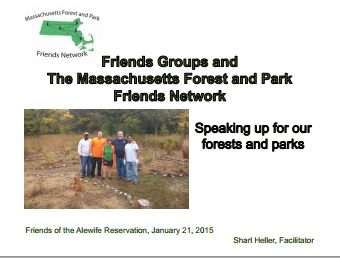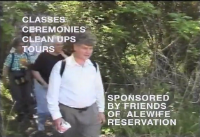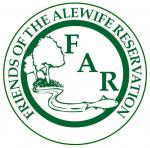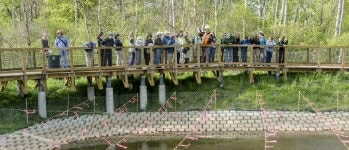This log is updated irregularly. Check back from time to time.
Note: If the color of the link on the home page changes back to its original color, it means that the file has probably changed, so check it out.
Week 1 - Bo
First week is always the hardest and it is now passed. Just a brief outlines, Monday was the orientation day. Campers arrived and we handed out the packets that included all the materials we needed for this year’s camp and other things that we were going to talk about. Afterwards, Elley, my co-worker and I planned on some name games for them so that they can get familiar with each other. In the afternoon, we went to the reservation and had a visit there. We played a little pole game with 3 different teams so that we knew the area better and could follow directions and notice the ecology.
Wednesday was officially the first camp day. In the morning, we met Steve Gillies, gardner, and went to his and city community garden to turn over some soils and weed in order for the plants to grow. We divided to two groups, and we did great job finishing turning over the soils and fertilizing. We’ll follow this up next few weeks to plant seeds and more weeding. In the afternoon on Wednesday, Pepper Greene took us into the Silver Maple Forest which may disappear soon. We did tree rubbing over there and campers seemed to really enjoy the way how tree rubbing process such as pressing paper and colored crayons on bark outline. Pepper will come again and finished up making the post cards with the rubbings.
Friday Jason Taylor came and taught campers about energy efficiency and impact they can make to save the planet on daily basis. He is a energetic and terrific guy that really attracts a lot of attention and developed an interesting topic. They liked the idea of “vampire’ metaphoring or ‘sucking’ the electricity that was left on when it should have been shut off. Campers are very concerned about their own energy efficiency usage and really want to make a reduction impact. In the afternoon, Elley and I took them to the North trail to do some tree identifications. We divided into 4 groups and they had the field guides with them. They have collected some samples and will upload them on to Wikispace this Monday.
Elley and I did great job keeping up and communicating with the consultants. It’s just some details we need to work on. For example, we need to keep reminding ourselves and campers about the daily chores they need to do. Do they wear long pants? If not, do they put on the boots while on the reservation to prevent lyme disease. We need to ensure that everyone is paying attention and follow up with what they learn with ecology. Those kinds of details and concepts Elley and I need to keep reminding and refreshing the campers and ourselves about.
Week 2 - Elley
This week started off with a really great day working outside. Monday morning we spent the first hour in the office journaling about the past week and finishing up any loose ends that we had. We finished looking up the trees that the campers couldn’t identify, and had a great discussion about the things that we had learned from the past week as they applied to our daily lives.
We met with Steve in the morning to plan out our garden spaces. In two different groups we each decided what we wanted to plant, and where in the garden would be best to plant it. The groups then went out to the garden and got down and dirty in the soil. They learned how to plant their garden from seeds, seedlings, and even how to transplant some. Some of the garden will be harvestable by the end of camp, but most of it will be there for the campers in the fall when they want to get away from the city life for a while. They are always welcome to come back and snack on their hard work, said steve.
The afternoon was the first time that the campers got to see the native garden. This work was more structured and kept the campers more engaged. They were excited to come back and finish the work, but sad that we would only be able to come back one or two more times in the camp.
On Wednesday we went out to the MWRA for our first field trip. Minus the weather, it was a good trip. We only got a shortened tour of the water treatment plant, and were unfortunately not able to go outside. But we did learn where the waste water comes from, how it gets separated, where those separated parts go, and what gets done with them. The kids then were able to walk around and look at the the old steam machinery used to pump the waste water up from the pipes below, before we were shuttled back to our bus and back to the office.
Friday we spent the whole day with Matt Wilson learning about water quality. In the morning he spent time with us talking about the different applications of learning the things we are learning in camp. He gave relevant context to everything we had done so far and made the campers see why it is important that they learn and do the hard work that we have them doing at the camp.
In the afternoon we went out into the reservation for the first time on the North Trail. We went all the way out to Little Pond for our first collection site. All 4 groups tested for pH, turbidity, nitrate, phosphate, coliform, dissolved oxygen levels, and temperature. We then moved onto the river that runs along the trail, and we did the same tests. We had to get back to meet with Pepper Greene to finish the cards from last week.
Back at the office was a good way to finish up the second week. With laughter, and good natured humor, the campers really seemed to be well bonded. I can only hope that this continues throughout the rest of the camp.
Check back later for more entries.
- Home
- Directions
- FAR Wildlife Blog
- Calendar
- News
- Donate Now
- Get Social!
- Storm Water Wetlands
- Plants and Restoration
- Photos
- Videos
- About & Projects
- Master Plan for Alewife
- Archive
- Newsletters
- Contact
 Presentation Spotlighting Alewife Reservation
Presentation Spotlighting Alewife Reservation
 Follow us on Twitter
Follow us on Twitter
 Like us on Facebook
Like us on Facebook
 Follow us on Instagram
Follow us on Instagram
Forward our web address to a friend!
- An Urban Gem - Alewife Reservation Nature Preserve
- Envisioning The Silver Maple Forest
- History and Policies of Cambridge, Belmont, and DEP
- Storm Water Wetlands
- Friends of Alewife Reservation brochure
(front, back) - Technical Analysis of Upper Alewife Basin
- Watershed: An Excursion in Four Parts
- The River Is A Restless Spirit: Life in the floodplain forest
-
Assessment of Silver Maple forest for DEP Adjudicatory hearings and
Patrick Fairbairn, author of the Assessment - Community Native Garden Flora
The
Alewife Reservation
is a unique natural resource for the communities of Belmont, Arlington and Cambridge
and home to hundreds of species, including hawks, coyotes beavers, snapping turtles, wild turkeys and muskrats,
the reservation is a unique natural resource for the community.
Historical information (Powerpoint)
Friends of Alewife Reservation works to protect and restore this wild area and the surrounding area for the water quality, native plants, animals and over 90 bird species with paths for walking, running and biking, recreation, and for classroom education and research. We regularly steward and preserve the Reservation area for wildlife and for the enjoyment of present and future generations.

(video)
By-Laws
About Friends of Alewife Reservation
Statement of Purpose
Citizen Forester newsletter archive
The Birds of the Cambridge Region of Massachusetts

by William Brewster 1906
Nuttal Ornithological Society
Biodiversity Study of Alewife Reservation Area: Species, Habitat, Ecosystems

Inventories by David Brown, wildlife assessor (2003, 2004.) Published by and available from FAR for $10. Write or call for your copy. (sample)
Updated Dave Brown Inventories (2008, 2010)
Inventories of Alewife Reservation Wetland Plants by Walter Kittredge, Botanist (2013)
Email: alewife@greencambridge.org
Join our mailing list
For technical problems with this website, email: webmaster@friendsofalewifereservation.org

